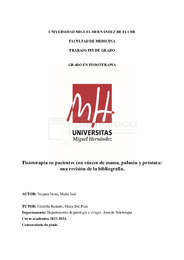Título :
Fisioterapia en pacientes con cáncer de mama, pulmón y próstata: una revisión de la bibliografía. |
Autor :
Vergara Varea, María José |
Tutor:
Córdoba Romero, María del Pilar |
Editor :
Universidad Miguel Hernández |
Departamento:
Departamentos de la UMH::Patología y Cirugía |
Fecha de publicación:
2024-06-01 |
URI :
https://hdl.handle.net/11000/33680 |
Resumen :
Introducción: El cáncer abarca enfermedades de carácter celular cuya fisiopatología básica es la acumulación anormal de células. Es un problema sociosanitario a nivel mundial, su prevención es una meta primordial en salud pública. El cáncer de mama y próstata son los tumores más frecuentes en mujeres y hombres respectivamente, el cáncer de pulmón constituye la primera causa de muerte por cáncer. Existe evidencia sobre la fisioterapia para tratar las secuelas de esta enfermedad.
Objetivos: Conocer la efectividad de la fisioterapia en pacientes con cáncer de mama, pulmón y próstata.
Material y métodos: Se realizó una búsqueda bibliográfica de artículos publicados en los últimos 5 años en las bases de datos Pubmed, PEDro, Cochrane, Scopus y Embase. Se han seleccionado 18 ensayos clínicos que estudian la fisioterapia en estos cánceres.
Resultados: Intervenciones de ejercicio aeróbico y resistencia mejoran la calidad de vida en pacientes con cáncer de mama. Combinados con estiramientos mejoran la fatiga, la capacidad funcional y función física. Otras intervenciones como terapia linfática descongestiva, facilitación neuromuscular propioceptiva, terapia de realidad virtual también muestran beneficios.
El entrenamiento de la musculatura respiratoria es efectivo en pacientes con cáncer de pulmón.
Programas de fisioterapia pueden mejorar la incontinencia urinaria prostatectomía, además el ejercicio aeróbico y de resistencia muestran beneficios en la función física y muscular.
Conclusión: Las intervenciones de fisioterapia mostradas son eficaces frente a las secuelas de estos cánceres.
Introduction: Cancer encompasses diseases of a cellular nature whose basic pathophysiology is the abnormal accumulation of cells. It is a global health and social problem, and its prevention is a major public health goal. Breast and prostate cancer are the most common tumours in women and men respectively, and lung cancer is the leading cause of cancer deaths. There is evidence on physiotherapy to treat the sequelae of this disease.
Objectives: To determine the effectiveness of physiotherapy in patients with breast, lung and prostate cancer.
Material and methods: A bibliographic search of articles published in the last 5 years was carried out in the Pubmed, PEDro, Cochrane, Scopus and Embase databases. Eighteen clinical trials studying physiotherapy in these cancers were selected.
Results: Aerobic and resistance exercise interventions improve quality of life in breast cancer patients. Combined with stretching, they improve fatigue, functional capacity and physical function. Other interventions such as lymphatic decongestive therapy, proprioceptive neuromuscular facilitation, virtual reality therapy also show benefits.
Respiratory muscle training is effective in lung cancer patients.
Physiotherapy programmes can improve prostatectomy urinary incontinence, and aerobic and resistance exercise show benefits in physical and muscular function.
Conclusion: The physiotherapy interventions shown are effective against the sequelae of these cancers.
|
Palabras clave/Materias:
cáncer
modalidades, fisioterapia
fisioterapia
técnicas de fisioterapia
rehabilitación |
Área de conocimiento :
CDU: Ciencias aplicadas |
Tipo de documento :
info:eu-repo/semantics/bachelorThesis |
Derechos de acceso:
info:eu-repo/semantics/openAccess
Attribution-NonCommercial-NoDerivatives 4.0 Internacional |
Aparece en las colecciones:
TFG - Fisioterapia
|
 La licencia se describe como: Atribución-NonComercial-NoDerivada 4.0 Internacional.
La licencia se describe como: Atribución-NonComercial-NoDerivada 4.0 Internacional.
.png)
